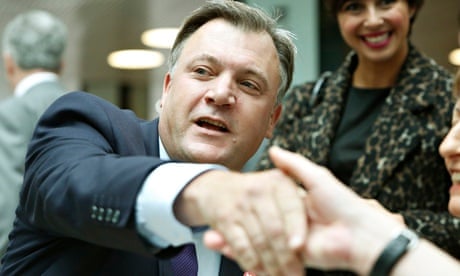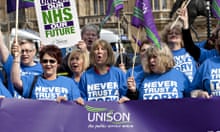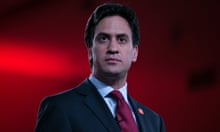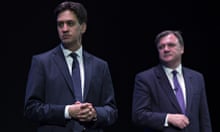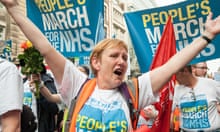Labour will seek to fight the next election on the twin issues of stagnant living standards and safeguarding the NHS, according to Ed Balls, in an interview before the party conference, which begins on Saturday.
But the shadow chancellor said voters would only back Labour's promise of change if it is seen to be credible and costed. In an effort to show his determination to be tough on public spending he ruled out free universal child care in the next parliament, as well as free bus passes for 16- to 18-year-olds.
He also said he would not be imposing extra taxes to pay for the health service, but promised to do "whatever it takes to save the NHS", remarks that suggest he will either ring-fence public spending for the health service, or find another way of raising extra revenue.
The Kings Fund thinktank this week warned "the next government will arrive in office with the NHS facing financial meltdown and social care in crisis", complaining there is a deafening silence from politicians on how they will fund the NHS in the next parliament.
Balls is keenly aware that Labour is still trailing the Tories by 25% on the economy, even before the warnings about the risk of change deployed so effectively by industrialists, the Treasury and media in the Scottish referendum, had been sounded.
He acknowledges that the country wants change, but only change people can believe in – a phrase borrowed from the Obama 2008 campaign.
"Sometimes in these debates you hear it said that Labour has got to inspire people to come to vote Labour with a message about change, but if we have a message of inspirational change that voters do not think is credible, or adds up, the very same people will say 'I cannot trust them to deliver'.
"These are not different groups of people. Those that worry about the deficit and the national debt and uncosted spending commitments are the same people that want change. So they want to know we will change things, and they want to know we will be tough and rigorous with their taxes. People on lower and middle incomes have had to tighten their belts and their view is that they want government to do the same."
"Everything has to be costed and affordable. This election will be a battle of the plans. So when we say 'we will abolish the bedroom tax' we have shown how we will pay for it, when we say 'we will cut the 10p rate for working people' we say how we will pay for it and the same is true of free child care for 25 hours."
He claims the electorate are not in the mood for pyrotechnics. "We are not just making big aspirational commitments. I don't think at the moment that adds up for people – they want nuts and bolts details."
He then cites two examples of his refusal to overdo the aspirational change, even if it has set him at odds with parts of the Labour party. "To give you an example, Harriet Harman, Yvette Cooper and Lucy Powell and others have all been pushing to see whether we can do more on childcare and we have said how we can pay for an increase in free childcare to 25 hours. But then some people have said Labour could say as an aspiration 'we want free universal childcare'. Well I would love to see free universal child care, but that is not something we are going to be able to afford in the next parliament and that is something we should admit. The same is true of free bus travel for 16-, 17-, 18-year-olds: it's a good thing but we cannot afford it."
This takes him to the health service – an issue that he wants at the heart of the Labour election campaign, and the debate about whether its dire state after four years of effective spending freeze requires special treatment. He is eager to emphasise the importance of reform, but leaves the door ajar to extra cash, but not in the form of specific tax rises.
"What I am not doing is proposing another tax rise for working people to fund the NHS. I think the budgets for the NHS are very tight and we can see waiting times rising. There is a real worry and concern and among patients. I want to do what it takes to make sure the NHS is safe in the next parliament."
He added: "We will not only repeal the NHS privatisation laws, we will make sure the NHS remains safe under a Labour government and will continue to provide the free care, best drugs, and the new treatments. We are not going to see the NHS undermined in the way that it has in this parliament. It is one of the great achievements of the 20th century. It is a beacon for the world in the 21st century. I want to do whatever it takes to save the NHS under a Labour government, but I am not proposing any tax rises."
"If within the overall total of public spending we can release money for the NHS that is what we will do. If we can find ways to make savings within the NHS budget that is what we do. I want to make sure the NHS is strong and protected in the future but in 2015-16 our starting point will be the government's spending plans."
His formulation leaves open the possibility of a transfer of resources from other departments both in 2015-16 and afterwards.
"If we can get the economy growing more strongly and release more money for the NHS and get the deficit down that is what we will do."
Balls is also adamant he did not call it wrong on the need for a fiscal stimulus to produce a recovery, adding he was happy to debate the chancellor, George Osborne, any time.
He explains: "I said in the summer of 2010, I feared that with a euro crisis building, the American recovery uncertain, to attempt to have rapid deficit reduction would not work and would backfire. The outcome is the economy barely grew for three years and George Osborne's attempts to balance the budget by 2015 are in tatters. I am very happy to have that debate about who is right and who is wrong, but look we are in a different phase now because the economy is growing again.
"So the issue is not pump priming to get growth back – that should have been done at an earlier stage. The issue is to how to make growth sustainable and strong. Look at the number on exports, business investment, the trade deficit, apprenticeships for young people – the government is not moving on any of these issues."
He also insists that despite the year-long recovery and the rapid decline in unemployment, voters remain unhappy, largely due to structural changes in the labour market hollowing out old professional middle class jobs, a trend that predated the recession. "For most people they feel the economy is not working for them, and things are not getting better. Wages are not keeping pace with prices. Business investment is still not growing strongly. The living standards crisis is as acute as it was two or three years ago, so people are crying out for change. But the challenge for us is there is a cynicism about whether politics can change things for the better. That is what we have to overcome this week and in the runup to the election."
